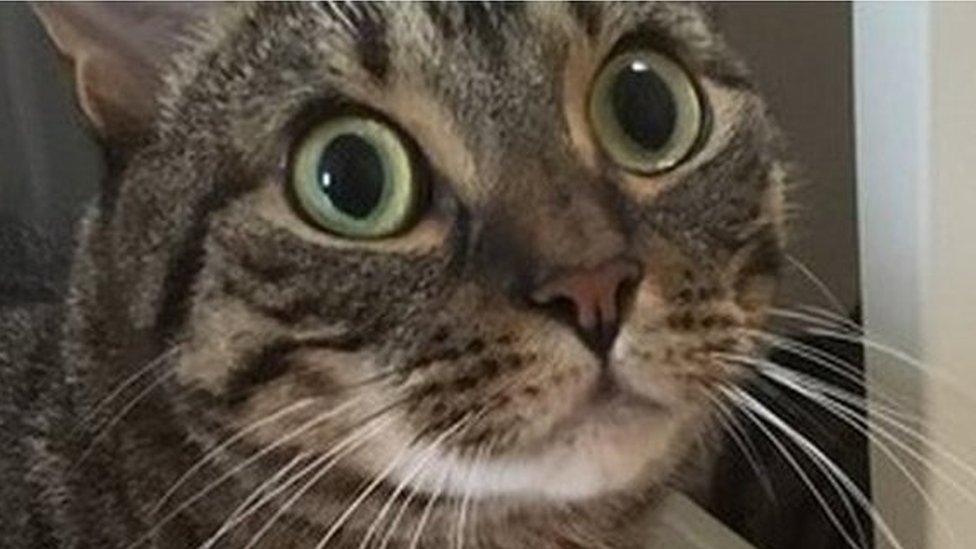Are we living in a golden age of satire?
- Published
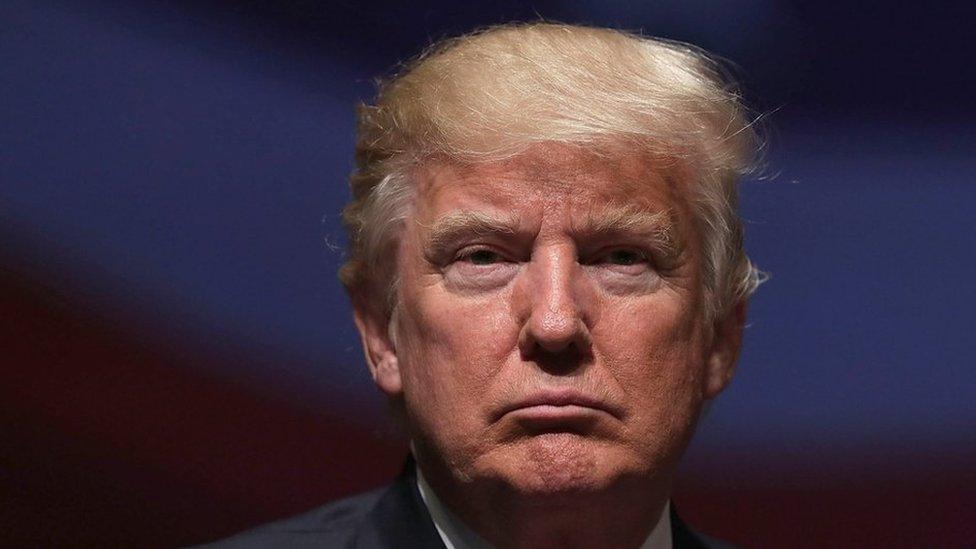
Donald Trump continues to fuel satire in the US and abroad
Fuelled by political turmoil in the UK and US, it seems our thirst for satire is at an all-time high. But why is it so appealing?
At the London office of the UK's most popular satirical magazine, Private Eye, its editor and TV personality Ian Hislop is characteristically frank in his answers.
The magazine's UK sales are at an all-time high, up 25% on five years ago, but Hislop shies away from taking the credit.
"If I'm honest, I think it's because of Brexit and Donald Trump," he tells the BBC's Victoria Derbyshire programme.
"People have become more interested in politics and also quite gloomy about it. Private Eye offers some jokes, some light relief and hopefully some insight - though I'm less confident about that!" he says.
Founded in 1961, examples of Private Eye's acerbic wit and famed front covers form a large collage on one of the office walls.
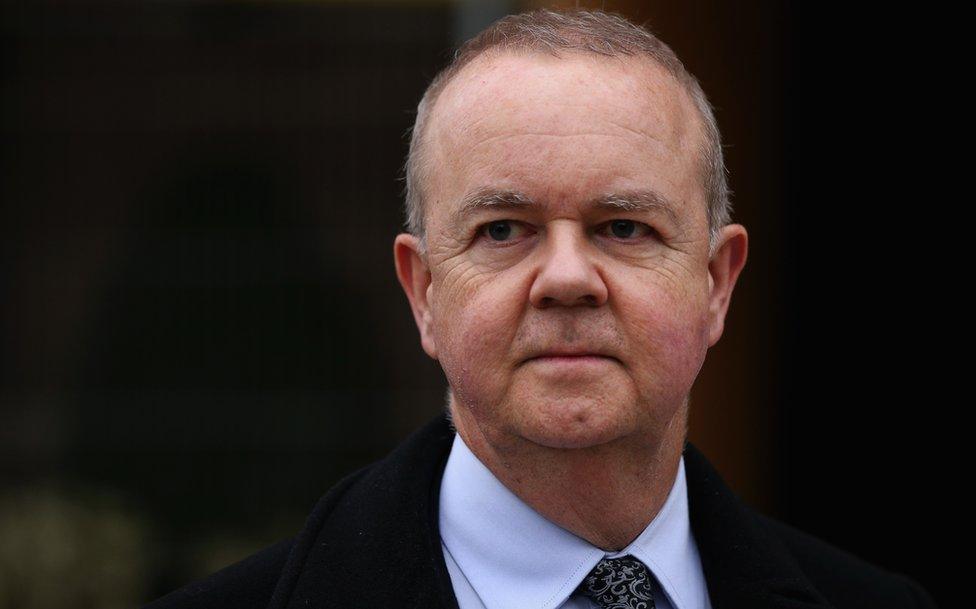
Ian Hislop: "Private Eye was listed as fake news by an American academic"
Its humour, however, is clearly lost on some individuals.
"Private Eye was listed as fake news by some American academic, who didn't get any of the jokes," Hislop says in bemusement.
"He decided when we said the Queen had signed a petition to stop Trump coming over to the UK, [we were reporting that] she actually had."
Hislop admits that personalities like the US president - with his larger-than-life persona and unapologetic brand of politics - are a gift to satirists.
But his first reaction to his election win was "as a responsible citizen and human being," he says, "so I'm appalled, I'm terrified."
He adds, however, that he also feels "very lucky" as a satirist that "Trump is going to provide most of the jokes for the foreseeable future".
'Satire, marvellous'
Satire is currently experiencing something of a purple patch in the Western world. In the US, there are no fewer than 24 nightly talk shows to guide fans through the day's top stories.
But while leaders come and go, the art of satire, Hislop says, remains consistent - "not only over the decades, but pretty much over the centuries".
He points to one of his favourite covers - Bush: Countdown To War - in which former US President George W Bush gets his numbers in the wrong order.
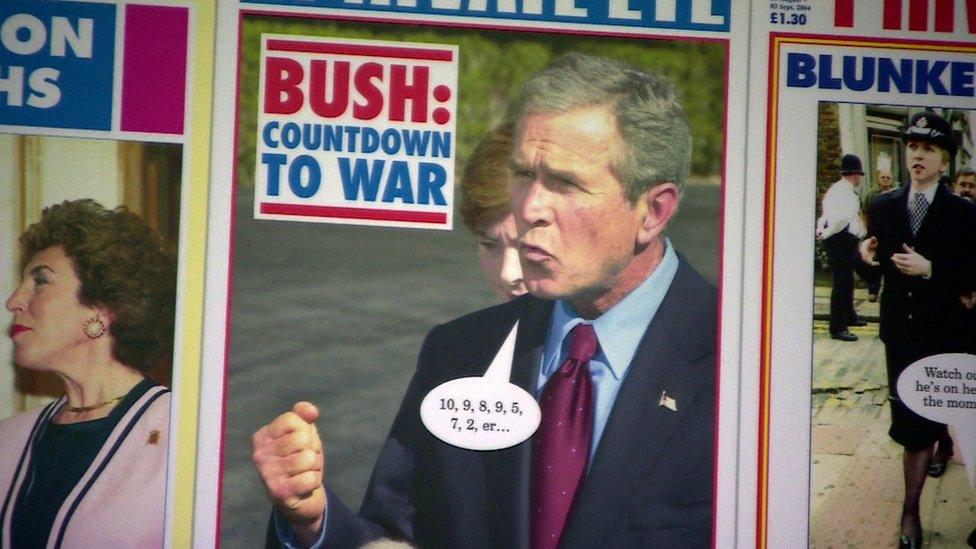
The front cover featuring Bush: Countdown To War is on show in Private Eye's office
The magazine's approach to satire, he says "tends to be the same" no matter who the subject.
The difference is in the audience's reaction.
"Satire goes in and out of fashion. Sometimes everyone says 'ooh satire, marvellous, we must have more of it'. And then during the down periods they say 'oh really, it's pathetic'," Hislop explains.
He rejects the idea, however, that Private Eye is establishing an unhealthy distrust of politicians within the public.
"Our job is to make people honest," he says. "To make people think that if they do [something wrong], they will be found out."
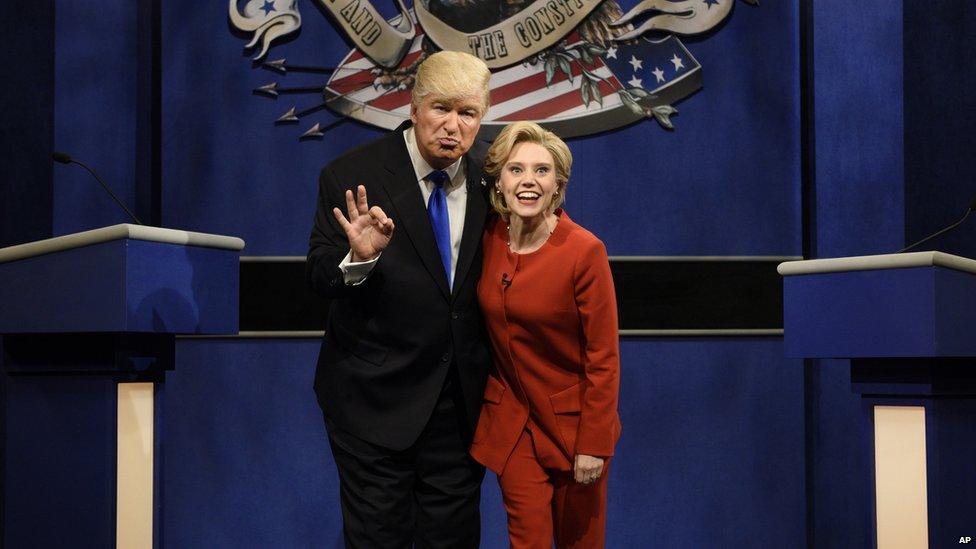
Alec Baldwin's impressions of Donald Trump on Saturday Night Live have led to the president saying the actor's portrayal "stinks"
Comedian Geoff Norcott, a working-class Leave voter, is not shy in using political material in his routine.
"One thing about Remainers is that they don't understand their arguments were oddly racist themselves," he jokes on stage.
"They're like: 'Well who's going to come and do the menial jobs?'. Is that how you see the EU, supplying you with economic Oompa-Loompas?"
Norcott claims to be the only pro-Conservative, pro-Brexit stand-up comedian in the UK.
He hopes this brand of stand-up can change perceptions.
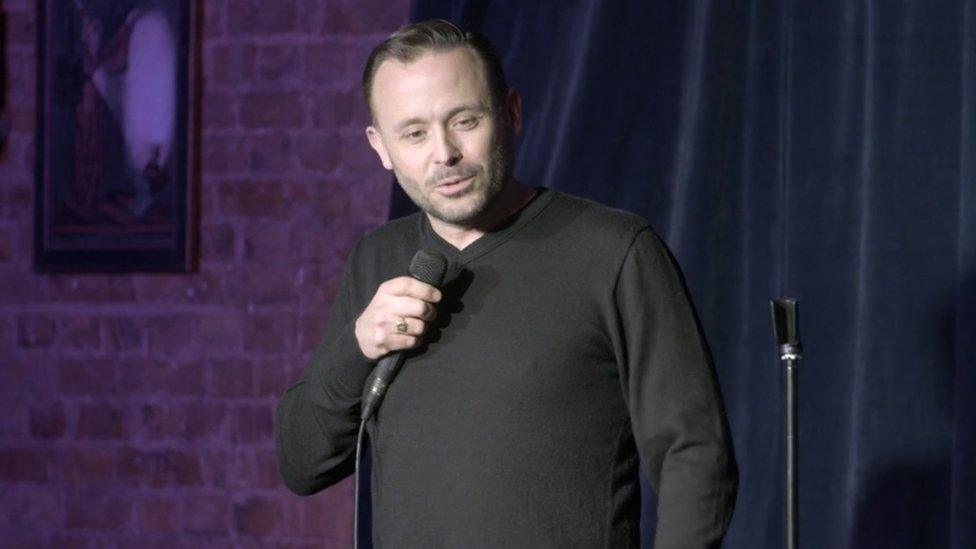
Geoff Norcott claims to be the only pro-Conservative, pro-Brexit stand-up comedian in the UK
"The stereotype of a working-class Leave voter is perhaps a bit ignorant, uneducated, possibly racist - like we all took one bite on a straight banana and started setting fire to croissants.
"I know those people exist, but I don't honestly think that that was the broad sweep of the working-class vote.
"Hopefully if you hear someone talk who's reasonably informed on the subject, it might make people think 'well maybe other working-class Leave voters felt that way'."
'Therapeutic'
While stand-up comedy has always been a source of political satire, in recent years there has been a boom in internet memes - created and shared by regular people, who want to mock the world in which we live.
Jim'll Paint It - an anonymous artist - takes people's requests for drawings and brings them to life.
Over time, he has seen a marked change in the sort of suggestions he receives.
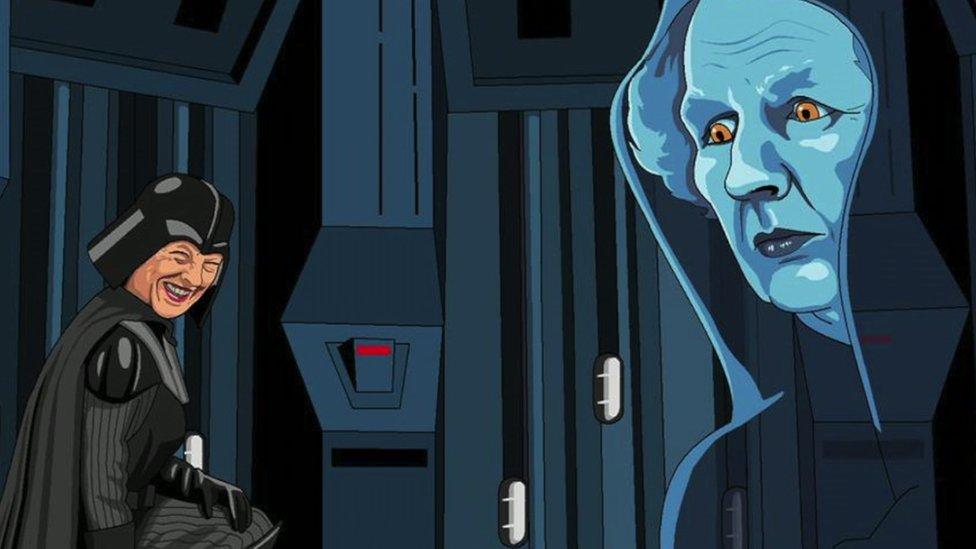
Jim'll Paint It artwork showing PM Theresa May as Darth Vader, with former Prime Minister Margaret Thatcher as the emperor
"There was absolutely no politics for the first one or two years, it was just celebrities and pop culture references," he explains.
"I think now it's massively changed and people do talk about politics more than they do celebrities and pop culture."
Jim says the power of memes is how quickly they can spread - perhaps at a faster rate than any other type of satire.
"They are a form of propaganda in a way, but instead of coming from the government, it's sort of a self-perpetuating propaganda. It's made by people and it's spread by people.
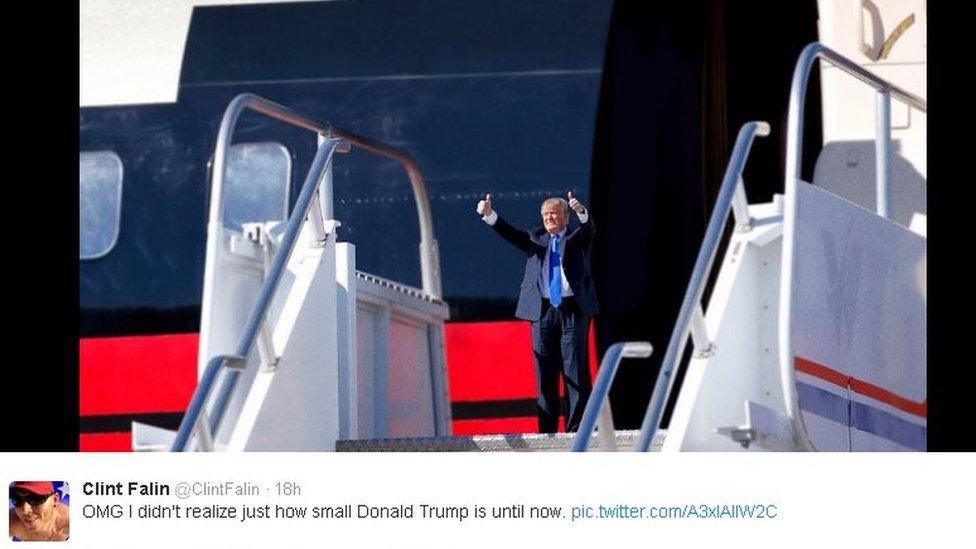
Memes in February saw people doctor images to make Donald Trump appear small
"It's not something that's broadcast to you, it's something that's passed on."
He has received criticism for some of his work - in particular a drawing of Donald Trump dead on a toilet, which he posted during the president's first day in office. But he says such images can be personally therapeutic to create.
"It was my way of just trying to get through that day, when the news came in," he says.
Watch the Victoria Derbyshire programme on weekdays between 09:00 and 11:00 on BBC Two and the BBC News Channel.
- Published18 February 2017
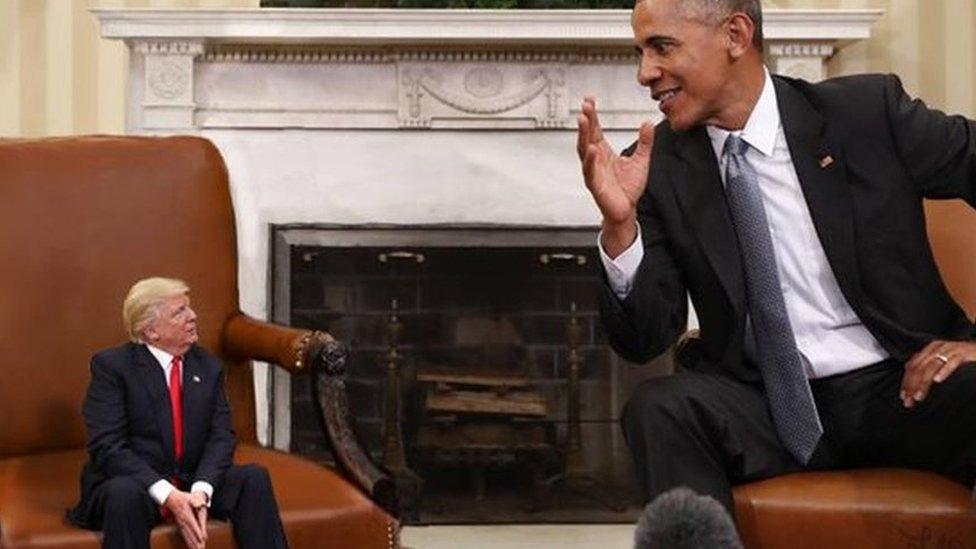
- Published16 October 2016

- Published24 June 2016
